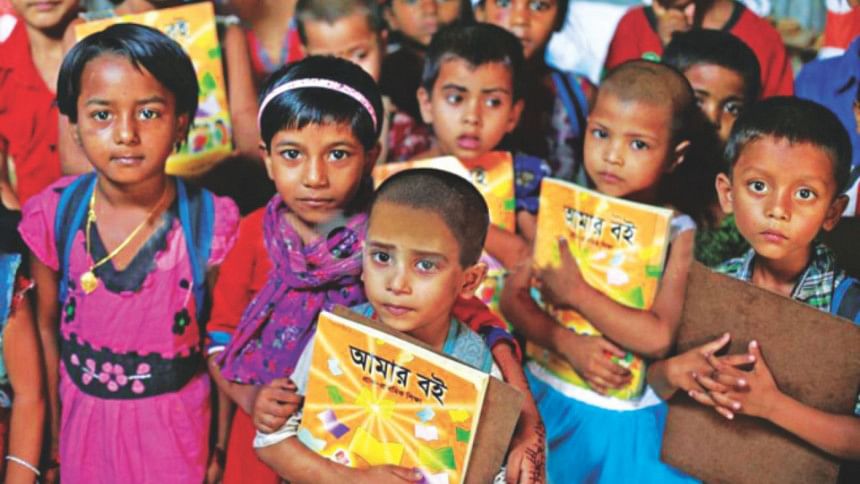New Education Budget: To fit the purpose

The Tk. 49,000 crore or US$ 6.3 billion allocated for education, when divided by the estimated 40 million students in the country, amounts to Tk. 12,000 per student public spending for a year or about US$ 150 on average for all levels of education.
The allocation for the Ministry of Primary and Mass Education means that the government may spend about US$ 120 for each primary level student, which is one-third of the average for South Asia. Per student primary school spending in the US is $11,700 and the average for OECD countries is $9,000.
While the increase in education allocations from the previous years is welcome, the positive trend must continue with a medium term plan to significantly increase education spending. The benchmarks recommended for the Sustainable Development Goal (SDG) 2030 and Education 2030 are 4 to 6 percent of GDP and/or 20 percent of the national budget.
The Minister of Finance listed various government achievements - formulation of curriculum, printing of books, recruitment of about 35,000 teachers, and introduction of pre-primary education in all primary schools. He has also mentioned a plan to recruit another 3,000 teachers and provide them with training. The budget speech reported an increase of primary education stipend-recipients to a total of 1.3 crore children.
Recruitment of 3,000 teachers would not make up for the annual turnover of teaching personnel leaving the system. Stipends to attract students can be helpful to the extent schools and teachers perform. It does not help when substantial spending on stipends undercuts essential inputs for teaching quality.
Although the minister admitted that there was a significant gap between the need to build more classrooms (he mentioned 63,000) and the initiatives taken with many schools in dilapidated conditions, a paltry sum of Tk. 200 crores was allocated along with a plea that private sector initiatives were urgently required to meet this deficit.
He further states that to achieve "illiteracy-free Bangladesh," the government is "planning to formulate a sector-wide programme for the non-formal education sector with a view to imparting basic literacy and life skill training to illiterate people of 15-45 age group." This is a topic that has been much talked about, but the concerned authorities, wedded to a conventional campaign approach and reluctant to build partnerships with NGOs and communities, have failed to get it off the ground.
In order to extend quality education and inculcate creativity in students, the minister proposed the continuation of the creative question-based examination system, introduction of ICT training and establishment of resource centres and multimedia classrooms. But there was little recognition here of the misgivings among experts and academics about how these are actually working.
In respect to higher education, the minister spoke about a number of specialised public universities that have already been established and more new technical universities which are to be set up. Expansion, without tackling the problem of serious quality deficits and management problems generated by out-of-control politicisation, obviously cause more harm than good.
It can be argued justifiably that a budget statement is not a manifesto of change and reforms, unless the implementing ministries and government policies put these high on their agenda. We, therefore, essentially see a continuation of the status quo with some expansion within the existing structure.
A hint of imagination and vision can be found in parts of the Finance Minister's speech, not specifically within the education sector, where he expounds on some ideas he espouses, which may not necessarily be vigorously endorsed by the line ministries.
Mr. Muhith spoke about a child-focused budget and introduced a report titled 'Blooming Children: Prosperous Bangladesh', based on expenditures of seven ministries which have programmes for children. Whether this initiative will bear fruit will depend on what is being done by the concerned ministries to critically look at their budgets and realign them towards addressing children's needs.
The Finance Minister noted that the working age population in Bangladesh is steadily rising and will keep growing till 2043. He mentioned the initiative to set up a National Human Resource Development Fund (NHRDF) and processes for setting up the National Skills Development Authority (NSDA) to be completed this year. Skill development ideas and programmes have been placed with the Parliament in a booklet titled 'Skill Development: A Priority Agenda for Accelerated Growth'.
Two preconditions have to be met for these initiatives to bear fruit. The quality of basic education at primary and secondary level has to be such as to enable students to acquire basic general competencies in language, math and science. Secondly, the skill training providers must meet basic standards in quality and relevance. Bangladesh faces great challenges in both of these areas.
The Finance Minister was blunt in saying that the existing local government system seems to be the main impediment to progress today. He advocated the devolution of power, not just decentralisation, and reforms in the local government system to make the transition to the district government system easier. But, not much by way of practical steps in budget making is evident for even a pilot initiative to move towards a district budget and government. Could a beginning be made in the education sector with district and upazila-based planning and management of primary and secondary education?
How can the logjam be broken in the concerned ministries which remain bogged down with day-to-day housekeeping, with little time and capability to look at the structural issues and take a longer term view? This basic limitation is reflected in the budget statement and the allocation proposals.
The Finance Minister noted that the formulation of an action plan to implement the SDGs is underway, adapting and aligning these to national priorities.
Mr. Muhith mentioned aligning SDGs with ministry/division performance indicators within the Medium Term Budgetary Framework with such performance indicators being included in the Annual Performance Agreements of ministries/divisions. The Principal Secretary at the Prime Minister's Office has been put in charge of this process, the minister informed the Parliament.
This process can be a routine bureaucratic exercise within the government agencies, quite within the existing pattern and structure. It could also be a way of looking ahead to the future and thinking creatively, if the process is opened up with the active participation of civil society, NGOs and academics who are all stakeholders in the future of the nation. Resources and energy of people then can be directed to fit the national agenda.
The writer is Professor Emeritus at BRAC University.

 For all latest news, follow The Daily Star's Google News channel.
For all latest news, follow The Daily Star's Google News channel. 








Comments